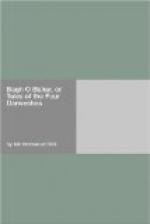When King Akbar ascended the throne, then all tribes of people, from all the surrounding countries, hearing of the goodness and liberality of this unequalled family, flocked to his court, but the speech and dialect of each was different. Yet, by being assembled together, they used to traffic and do business, and converse with each other, whence resulted the common Urdu language. When his majesty Shahjahan Sahib Kiran [35] built the auspicious fort, and the great mosque, [36] and caused the walls of the city to be built; and inlaid the peacock throne [37] with precious stones, and erected his tent, made of gold and silver brocade; and Nawwab’ Ali Mardan Khan cut the canal [38] [to Dilli]; then the king, being pleased, made great rejoicings, and constituted the city his capital. Since that time it has been called Shajahan-abad, (although the city of Dilli is distinct from it, the latter being called the old city, and the former the new,) and to the bazar of it was given the title of Urdu-e Mu’alla. [39]
From the time of Amir Taimur until the reign of Muhammad Shah, and even to the time of Ahmad Shah, and Alamgir the Second, the throne descended lineally from generation to generation. In the end, the Urdu language, receiving repeated polish, was so refined, that the language of no city is to be compared to it; but an impartial judge is necessary to examine it. Such a one God has at last, after a long period, created in the learned, acute and profound Mr. John Gilchrist, who from his own judgment, genius, labour and research, has composed books of rules [for the acquisition of it]. From this cause, the language of Hindustan has become general throughout the provinces, and has been polished anew; otherwise no one conceives his own turban, language and behaviour, to be improper. If you ask a countryman, he censures the citizen’s idiom, and considers his own the best; “well, the learned only know [what is correct].” [40]
When Ahmad Shah Abdali, came from Kabul and pillaged the city of Dilli, Shah ’Alam was in the east. [41] No master or protector of the country remained, and [42] the city became without a head. True it is, that the city only flourished from the prosperity of the throne. All at once it was overwhelmed with calamity: its principal inhabitants were scattered, and fled wherever they could. To whatever country they went, their own tongue was adulterated by mixing with the people there; and there were many who, after an absence of ten to five years, from some cause or other, returned to Dilli, and stayed there. How can they speak the pure language of Dilli? somewhere or other they will slip; but the person who bore all misfortunes, and remained fixed at Dilli and whose five or ten anterior generations lived in that city, and who mixed in the company of the great, and the assemblies and processions of the people, who strolled in its streets for a length of time, and even after quitting it, kept his language pure from corruption, his style of speaking will certainly be correct. This humble being [viz. Mir Amman], wandering through many cities, and viewing their sights, has at last arrived at this place.




